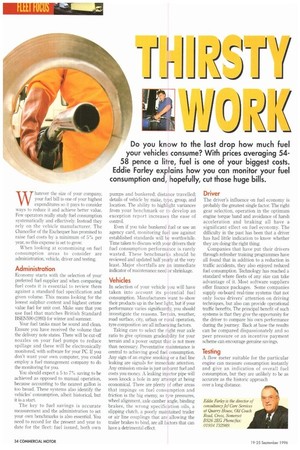W hatever the size of your company, your fuel bill is
Page 36

If you've noticed an error in this article please click here to report it so we can fix it.
one of your highest expenditures so it pays to consider ways to reduce it and achieve better value. Few operators really study fuel consumption systematically and effectively. Instead they rely on the vehicle manufacturer. The Chancellor of the Exchequer has promised to raise fuel costs by a minimum of 5% per year, so this expense is set to grow
When looking at economising on fuel consumption areas to consider are administration, vehicle, driver and testing.
Administration
Economy starts with the selection of your preferred fuel supplier and when comparing fuel costs it is essential to review them against a standard fuel specification and given volume. This means looking for the lowest sulphur content and highest cetane value fuel for unit cost. Make sure that you use fuel that matches British Standard BSEN590 (1993) for winter and summer.
Your fuel tanks must be sound and clean. Ensure you have received the volume that the delivery note states. There will be cut-off nozzles on your fuel pumps to reduce spillage and these will be electronically monitored, with software for your PC. If you don't want your own computer, you could employ a fuel management company to do the monitoring for you.
You should expect a 5 to 700 saving to be achieved as opposed to manual operation, because accounting to the nearest gallon is too broad. These systems also identify the vehicles' consumption, albeit historical, but it is a start.
The key to fuel savings is accurate measurement and the administration to set your own benchmarks is also essential. You need to record for the present and year to date for the fleet: fuel issued, both own pumps and bunkered; distance travelled; details of vehicle by make, type, group, and location. The ability to highlight variances from your benchmark or to develop an exception report increases the ease of control.
Even if you take bunkered fuel or use an agency card, monitoring fuel use against established standards will be worthwhile. Time taken to discuss with your drivers their fuel consumption performance is rarely wasted. These benchmarks should be reviewed and updated half yearly at the very least. Major shortfalls are an immediate indicator of maintenance need or shrinkage.
Vehicles
In selection of your vehicle you will have taken into account its potential fuel consumption. Manufacturers want to show their products up in the best light, but if your performance varies significantly, you should investigate the reasons. Terrain, weather, road surface, city, urban or rural operation, tyre composition are all influencing factors.
Taking care to select the right rear axle ratio to give optimum gradeability for your terrain and a power output that is not more than necessary. Preventative maintenance is central to achieving good fuel consumption. Any sign of an engine smoking or a fuel line leaking are signals for immediate attention. Any emission smoke is just unburnt fuel and costs you money. A leaking injector pipe will soon knock a hole in any attempt at being economical. There are plenty of other areas that impinge on fuel consumption and friction is the big enemy, so tyre pressures, wheel alignment, axle camber angle, binding brakes, the wrong specification oils, a slipping clutch, a poorly maintained trailer or air line couplings that are allowing the trailer brakes to bind, are all factors that can have a detrimental effect.
Driver
The driver's influence on fuel economy is probably the greatest single factor. The right gear selection, operation in the optimum engine torque band and avoidance of harsh acceleration and braking all have a significant effect on fuel economy. The difficulty in the past has been that a driver has had little indication to know whether they are doing the right thing.
Companies that have put their drivers through refresher training programmes have all found that in addition to a reduction in traffic accidents, they also enjoyed reduced fuel consumption. Technology has reached a standard where fleets of any size can take advantage of it. Most software suppliers offer finance packages. Some companies supply on-board real-time systems that not only focus drivers' attention on driving techniques. but also can provide operational traffic benefits, The principal benefit of such systems is that they give the opportunity for the driver to compare his own performance during the journey. Back at base the results can be compared dispassionately and so peer pressure or an incentive payment scheme can encourage genuine savings.
Testing
A flow meter suitable for the particular engine can measure consumption instantly and give an indication of overall fuel consumption, but they are unlikely to be as accurate as the historic approach over a long distance.








































































































